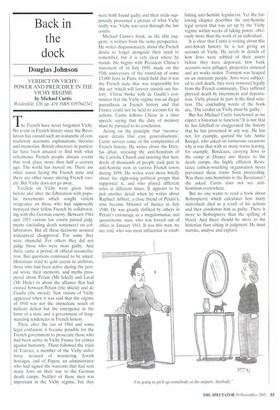Back in the dock
Douglas Johnson
VERDICT ON VICHY: POWER AND PREJUDICE IN THE VICHY REGIME by Michael Curtis
Weidenfeld. £20, pp, 419, ISBN 0297842242
he French have never forgotten Vichy. No event in French history since the Revolution has caused such an avalanche of contradictory accounts, explanations, theories and memories. British observers in particular have been amazed to find with what vehemence French people discuss events that took place more than half a century ago. The world has moved on. There are other issues facing the French state and there are other issues stirring French society. But Vichy does not go away.
Verdicts on Vichy were given both before and after the Liberation with popular movements which sought violent vengeance on those who had supposedly betrayed their fellow French by collaborating with the German enemy. Between 1944 and 1953 various law courts passed judgments (including death sentences) on collaborators. But all these decisions aroused widespread disapproval. For some they were shameful. For others they did not judge those who were most guilty. And there came a period of official reconciliation. But questions continued to be asked. Historians tried to gain access to archives, those who had been active during the period wrote their memoirs, and myths prospered about Petain (Mr Jekyll) and Laval (Mr Hyde) or about the alliance that had existed between Petain (the shield) and de Gaulle (the sword). New visions of Vichy appeared when it was said that the regime of 1940 was not the immediate result of military defeat hut the emergence in the form of a state and a government of longstanding tendencies in French history.
Then, after the law of 1964 and some legal confusion, it became possible for the French government to prosecute those who had been active in Vichy France for crimes against humanity. There followed the trials of Touvier, a member of the Vichy milice force accused of murdering Jewish hostages, and of Papon, an administrator who had signed the warrants that had sent many Jews on their way to the German death camps. Neither of these men was important in the Vichy regime, hut they were both found guilty and their trials supposedly presented a picture of what Vichy really was. Vichy was seen through the law courts.
Michael Curtis's book, as the title suggests, is written from the same perspective. He writes dispassionately about the French desire to forget alongside their need to remember, but it is very clear where he stands. He begins with President Chirac's statement of 16 July 1995, made on the 55th anniversary of the round-up of some 13,000 Jews in Paris, which held that it was the French state that was responsible for this act 'which will forever tarnish our history'. Chirac broke with de Gaulle's contention that the Vichy regime was an illegal parenthesis in French history and that France could not be held to account for its actions. Curtis follows Chirac in a later speech, saying that the duty of memory must be pursued to its conclusion.
Acting on the principle that 'inconvenient details blur easy generalisations', Curtis surveys some of the complexities of French history. He writes about the Dreyfus affair, stressing the anti-Semitism of the Catholic Church and insisting that hundreds of thousands of people took part in anti-Semitic riots in various French towns during 1898. He writes even more briefly about the right-wing political groups that supported it, and who played different roles at different times. It appears to be just another detail when he writes about Raphael Alibert, a close friend of Petain's, who became Minister of Justice in July 1940. He was greatly disliked by others in Petain's entourage as a megalomaniac and quarrelsome man, who was forced out of office in January 1941. It was this man, we are told, who was most influential in estab
lishing anti-Semitic legislation. Yet the following chapter describes the anti-Semitic legal system that was set up by the Vichy regime within weeks of taking power, obviously more than the work of an individual.
It is clear that Curtis is writing about this anti-Jewish history; he is not giving an account of Vichy. He revels in details of how Jews were robbed of their assets before they were deported, how bank accounts were pillaged, properties annexed and art works stolen. Torment was heaped on an innocent people. Jews were subjected to civil death, they were removed legally from the French community. They suffered physical death by internment and deportation. Vichy played its part in the final solution. The concluding words of the book are, 'The verdict on Vichy must he guilty.'
But has Michael Curtis functioned as we expect a historian to function? It is not that he has falsified or exaggerated the history that he has presented in any way. He has not, for example, quoted the late Annie Kriegel, who asked on numerous occasions why it was that with so many trains leaving, for example, Bordeaux, carrying Jews to the camp at Drancy and thence to the death camps, the highly efficient Resistance railway-wrecking organisation never prevented these trains from proceeding. Was there anti-Semitism in the Resistance? she asked. Curtis does not see antiSemitism everywhere.
But no one wants to read a book about Robespierre which calculates how many individuals died as a result of his actions and then condemns him as guilty. There is more to Robespierre than the spilling of blood. And there should be more to the historian than sitting in judgment. He must narrate, analyse and explain.


























































































 Previous page
Previous page